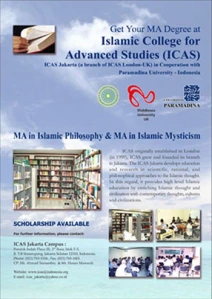COURSE OUTLINE
| College | |
| Degree | M.A./ Ph.D. |
| Course Title | A History of Islamic Mysticism 1 |
| Course Code | |
| Status | |
| Level | Postgraduate |
| Credit Hours | |
| Contact Hours | |
| Pre-requisites
(if any) |
– |
| Co-requisites
(if any) |
– |
| Teaching Methodology | |
| Method of Evaluation | |
| Lecturer | |
| Semester Offered | |
| Course Objectives
|
|
| Learning Outcomes | |
| Course Synopsis (course description)
|
History of Islamic Mysticism is a subject that will introduce to students the historical development of Islamic mysticism, from its formative period in the eight century to its mature development in the thirteenth centuries. Moreover, this subject will also discuss the life and works of Muslim mystics, and their essential doctrines. The purpose of this subject is to make students know well the development of Islamic mysticism, its movements from time to time, the biographies of its great figures and their fundamental doctrines and methods. |
WEEKLY PLANNER, TOPICS AND READINGS
| Week | Topics | Description of the Topics | Recommended Readings |
| 1 | Orientation | Gives students ideas of what will be presented inthis
subject, and general overview on the history of Islamic Mysticism |
|
| 2 | Ascetic Movement (Zuhd) | Discusses emergence of Islamic mystical movement
in the form of Asceticism (zuhd). |
|
| 3 | Hasan Basri & Rabi’ah | Discusses the beginning of tasawwuf movement, that flourished in Bashrah | |
| 4 | Dhu al-Nun al-Misri | Discusses his life and works, his mystical doctrine on
ma’rifah and the others. |
|
| 5 | Abu Yazid al-Busthami | Discusses his life and works, his doctrine of “ittihad” | |
| 6 | Junayd and Muhasibi | Discusses his life and works and his “sober” mysticism. | |
| 7 | Hallaj | Discusses his life and works and his teaching on “hulul.” | |
| 8 | Abu Hamid al-Ghazali | Discusses his life and works and his teaching and attempt to Harmonize fiqh and mysticism. | |
| 9 | Ahmad al-Ghazali | Discusses his life and works and his teaching on
“mystical quest.” |
|
| 10 | Farid al-Din ‘Attar | Discusses his life and works and his teaching on
“wahdat al-wujud” |
|
| 11 | Ibn ‘Arabi | Discusses his life and works and his teaching on “ishq” | |
| 12 | Jalal al-Din Rumi | Discusses his life and works and his teaching on “wahdat
al-wujud” and his influence on philosophy. |
REFERENCES
- Hujwiri, Abu Uthman, Kashf al-Mahjub
- Qushayri, Risalah al-Qushayriyyah
- Hakim Sana’i, Hadiqat al-Haqiqah
- ‘Attar, Farid al-Din, Tazkirat al-Awliya’
- ‘Attar, Mantiq al-Tayr
- al-Sulami, Tabaqat al-Sufiyyah
- Hallaj, al-Tawasin
- Ibn Arabi, Fusus al-Hikam
- Ibn ‘Arabi, al-Futuhat al-Makkiyyah
- Jalal al-Din Rumi, Mathnawi al-Ma’nawi
- Fakhry, Majid, A History of Islamic Philosophy.
- Mulyadhi Kartanegara, Menyelami Lubuk Tasawuf
- Haydar Amuli, Jami’ al-Asrar





 http://ic-jakarta.org/
http://ic-jakarta.org/







